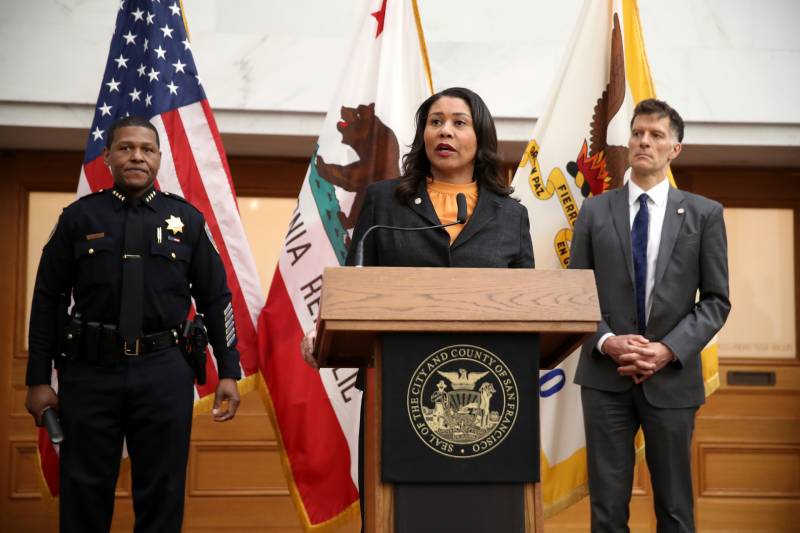Dr. Grant Colfax, director of the San Francisco Department of Public Health, said that it’s definitely too soon to tell. I think we’re fortunate in that we’re not seeing the numbers grow as rapidly, but I also think it has a lot to do with the fact that people are complying with the order.
However, this is the time where we can’t ease up. We also know that it’s going to get a lot worse before it gets better.
So, I think that it’s important for people to know that it’s definitely having an impact. And it’s yet to be determined as to what the impact will be, because we have not necessarily experienced the worst of it.
Do you think that San Francisco’s hospitals are prepared for that peak, despite concerns from health care workers?
I think what we’re trying to do is make sure we have what we need. We have made a request for 1,500 more ventilators, because that’s what we need. We need an additional 5,000 beds.
I think, ultimately, we’re going to have some real challenges with our health system if we don’t continue to comply with the order.
Shelter-in-Place
You’ve been ordering people to maintain their distance from the very beginning. How do you adjust this message over time? Especially for young people who may find it really hard to maintain as time goes by?
As time goes on, it’s going to be even more challenging. But the fact is, once we let up, that’s when we’re going to experience the worst of it. We are trying to prevent things from getting terrible.
Part of the need to socially distance ourselves from one another has everything to do with making sure that people don’t die and that we’re able to help those who end up sick. And that’s going to continue to be a challenge.
So, I don’t want people to take any of this for granted. I’m hopeful that people will understand and continue to comply.
Economic Impacts
San Francisco, along with other Bay Area counties, extended the shelter-in-place order and increased the restrictions — closing off playgrounds, dog parks and residential construction.
Are you concerned this ban on residential construction might worsen the city’s affordability crisis?
I’m definitely concerned. And what we’re trying to do is work with our county health officer to get clarity on some of those concerns. Because, yes, when this is over we want to make sure we have new housing. We want to make sure that we have places for people to live. We already have a very challenging homeless population as is. And as a result of this unanticipated pandemic, things could get worse.
So, we’re definitely concerned. But we also understand and respect the public health experts who are making these recommendations. Protecting public health has to be the priority, as hard as it is on our economy, on our housing market, on all of these things. We have to prioritize public health.
The San Francisco controller announced a pretty grim picture for the budget over the next two fiscal years — up to a $1.7 billion shortfall. What kind of cuts do you foresee, and how is this going to affect the city’s efforts to address the homeless crisis?
I think it’s going to be very challenging. And San Francisco is not unique in this challenge — I mean, this is going to be happening all over the country. We have reserves, but reserves are not going to sustain us. We’re going to have to make some hard decisions. I’m setting up a task force now to explore what we plan to do as a city, financially, to recover.
Laguna Honda Hospital
You reported during a news conference earlier today that nine staff and two patients have tested positive for COVID-19 at Laguna Honda Hospital. You’ve announced that there’s some federal assistance, a team, coming in to make recommendations.
The state Department of Public Health defines an outbreak at an institution like Laguna Honda as one case of an infectious respiratory illness, plus a second within 72 hours. By that definition, it seems that the outbreak at Laguna Honda started much earlier than the chief health officer called it.
I would defer to Dr. Colfax on the specifics around any health-related questions or health-related guidelines and comments.
But I will say that this is something that we have been focused on for some time — specifically early on when we terminated visitors to the campus and put in the kinds of systems to help protect people. I think it’s important that we focus on trying to keep people safe and trying to protect the residents of Laguna Honda and the staff. And that’s exactly what we’re doing.
Right now, [the team is] analyzing exactly what the best plan is moving forward. And until we receive that information, we will continue to do everything we can to maintain social distancing, to provide resources to the patients and to make sure that we’re complying with all the regulations.
How challenging is this going to be in such a sprawling facility?
It is going to be challenging. Patients, for the most part, can be kept apart with our social distancing policy.
The challenge, of course, is a lot of the people there are dependent upon … the nurses and the doctors and some of the social workers of the facility.
So I think that there were some [safety protocols] that were already in place and then we enhanced those. And, in the meantime, we’ll keep implementing them until there are further recommendations.
Looking back, do you think that the health department should have done more to control the infections earlier?
Laguna Honda was on our radar screen from the very beginning. So before this was brought to anyone’s attention, whether there was a patient or employee infected, there were already limitations around visitors and strict monitoring.

